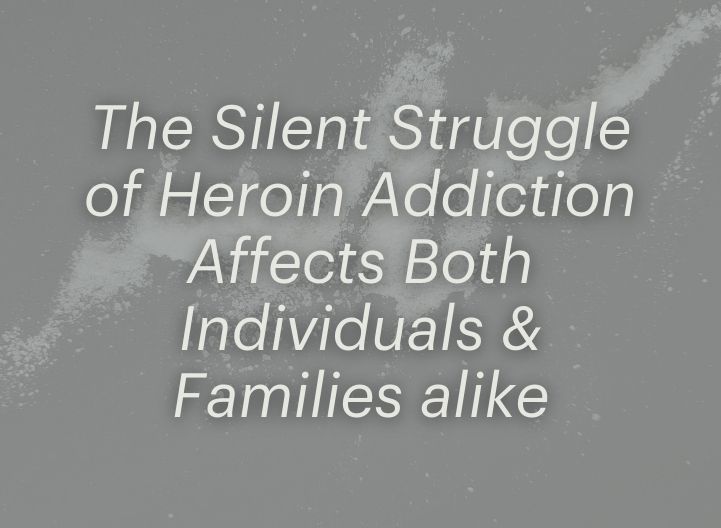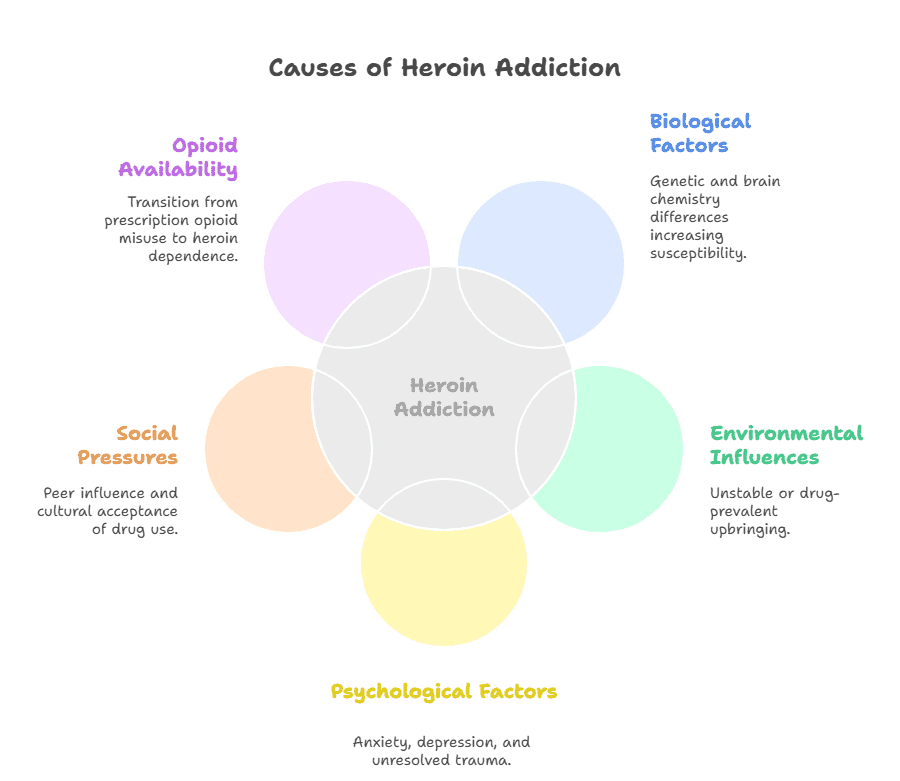Heroin addiction is a severe and life-threatening disorder marked by compulsive drug use despite harmful consequences. India’s opioid use prevalence is three times the global average, signaling an emerging opioid epidemic, with considerable state-level variation, according to Singh B. and Rao R.’s 2021 paper “Is There an Opioid Epidemic in India?”
The main causes of heroin addiction include genetic vulnerability, exposure to trauma, peer influences, and pre-existing mental health issues.
The symptoms vary across physical, behavioral, and emotional dimensions, ranging from drowsiness and needle marks to secrecy and mood swings.
The effects of heroin addiction are widespread, precipitating short-term consequences such as euphoria, nausea, and dry mouth, and long-term impacts such as insomnia, organ damage, and mental health disorders. Without treatment, heroin addiction leads to dangerous complications like infections, collapsed veins, and an increased risk of HIV.
Treatment for heroin addiction involves de-addiction activities such as detoxification, medication-assisted therapy, inpatient and outpatient care, and behavioral therapies.
Long-term recovery strategies involve counselling, relapse prevention, peer support groups, mindfulness practices, and adopting a healthier lifestyle.

What Is Heroin Addiction?
Heroin addiction is a chronic brain disorder that arises when repeated use of heroin disrupts the brain’s natural reward system. Chemically, heroin binds to opioid receptors in the brain, triggering intense surges of dopamine that reinforce compulsive drug-seeking behavior.
Physically, repeated use alters the body’s tolerance, requiring higher doses to achieve the same effect, while withdrawal symptoms emerge when heroin is not taken.
Psychologically, it disrupts decision-making, increases cravings, and diminishes control over one’s actions. Over time, these combined effects reshape brain circuits responsible for motivation, reward, and self-regulation.
The estimated worldwide average prevalence of opiate use (mainly heroin) in 2021 was about 0.6%. Around 31.5 million people worldwide use opiates non-medically, mainly heroin. South Asia is the largest consumer market for opiates, with a prevalence of around 1.1%, nearly twice the global average, as investigated by the United Nations Office on Drugs and Crime (UNODC, 2023).
How Do People Use Heroin?
People use heroin in different ways, including smoking, snorting, injecting, and, less frequently, orally consuming the drug. Smoking or inhaling heroin vapours provides a rapid high but avoids the risks of injections. Snorting delivers the drug through the nasal tissues, though it exacerbates damage to the nose and sinuses. Injecting heroin directly into the bloodstream, muscles, or under the skin is the most dangerous method, carrying the highest risk of overdose and infections. Each method influences the speed and intensity of the drug’s effects, contributing to the cycle of dependence.
Why Is Heroin So Addictive?
Heroin is so addictive because it rapidly interacts with the brain’s reward system, binding to opioid receptors that regulate pain and pleasure. This action triggers the release of dopamine, a neurotransmitter linked to feelings of euphoria and reinforcement.
Over time, recursive heroin use impedes the brain’s natural ability to release dopamine, breeding tolerance, where bigger amounts of the drug are needed to achieve the same effect. This progression creates physical dependence, where withdrawal symptoms occur if heroin is not consumed. These chemical and neurological changes trap individuals in a cycle of compulsive drug-seeking behaviour.
What Are the Causes of Heroin Addiction?
The causes of heroin addiction are biological predisposition, environmental influences, psychological vulnerabilities, social pressures, and exposure to trauma. These factors interact to accelerate the likelihood of dependence.
Common causes of heroin addiction are given below:
- Biological factors: Genetic vulnerability and differences in brain chemistry heighten susceptibility.
- Environmental influences: Growing up in an unstable or drug-prevalent environment raises risks.
- Psychological factors: Anxiety, depression, and unresolved trauma contribute to drug use.
- Social pressures: Peer influence and cultural acceptance of drug use play a role in uptake.
- Availability of opioids: Prescription opioid misuse transitions into heroin dependence.

What Are the Symptoms of Heroin Addiction?
The symptoms of heroin addiction are physical, behavioural, and emotional changes that reflect the drug’s deep impact on the body and mind. Physical signs are noticeable health deterioration, while behavioural symptoms manifest as secrecy, neglect of responsibilities, and risky actions. Emotional disturbances such as anxiety, irritability, and mood swings further indicate the presence of addiction, showing how heroin affects multiple aspects of life.
Physical Symptoms of Heroin Addiction
The physical symptoms of heroin addiction are given below:
- Constricted or “pinpoint” pupils
- Needle marks or track marks on arms or other body parts
- Extreme drowsiness or frequent “nodding off”
- Noticeable weight loss and poor physical appearance
- Frequent respiratory problems, such as slow or shallow breathing
Behavioural Symptoms of Heroin Addiction
The behavioural symptoms of heroin addiction are given below:
- Secretive or deceptive behaviour to hide drug use
- Neglecting work, school, or family responsibilities
- Stealing money or valuables to support drug use
- Loss of interest in hobbies or social activities
- Repeated isolation from friends and loved ones
Emotional Symptoms of Heroin Addiction
The emotional symptoms of heroin addiction are given below:
- Intense mood swings ranging from euphoria to depression
- Persistent anxiety and nervousness
- Irritability or aggression when heroin is unavailable
- Emotional detachment or lack of motivation
- Feelings of hopelessness and despair
What Are the Withdrawal Symptoms of Heroin Addiction?
The withdrawal symptoms of heroin addiction are anxiety, sweating, irritability, fatigue, and insomnia, among others. These symptoms appear within hours of the last dose and peak in severity within a few days.
Common withdrawal symptoms of heroin addiction are given below:
- Anxiety and restlessness
- Excessive sweating
- Fatigue and weakness
- Irritability and mood swings
- Insomnia or disrupted sleep patterns
- Increased breathing rate
- High blood pressure
- Muscle aches and cramping
What Are the Effects of Heroin Addiction?
The effects of heroin addiction are physical deterioration, psychological distress, and severe social consequences that worsen over time. In the short term, heroin produces euphoria, drowsiness, and slowed breathing, but it also brings about nausea, confusion, and loss of appetite. Long-term use has more destructive outcomes, involving insomnia, collapsed veins, organ damage, and lasting mental health disorders, all of which make recovery more difficult without treatment.
In Punjab, heroin abuse is reported as high, linked to availability and trafficking routes from Afghanistan and Pakistan. A study in Amritsar found over 54% of morphine-positive patients were abusing heroin, with increasing heroin use linked to economic crimes and health risks like HIV and hepatitis, as detailed by Sharma et al. 2017 in “Drug Abuse: Uncovering the Burden in Rural Punjab.”
Short-Term Effects of Heroin Addiction
The short-term effects of heroin addiction are given below:
- Intense euphoria or “rush”
- Nausea and vomiting
- Dry mouth
- Loss of appetite
- Severe itching
- Slowed breathing or shallow respiration
- Clouded mental function and confusion
Long-Term Effects of Heroin Addiction
The long-term effects of heroin addiction are given below:
- Insomnia and disrupted sleep patterns
- Chronic constipation
- Collapsed veins from repeated injections
- Liver and kidney damage
- Development of mental disorders such as depression or anxiety
- Persistent cognitive impairment and memory loss
- Elevated risk of infectious diseases like HIV and hepatitis
What Are the Treatments for Heroin Addiction?
The common treatments for heroin addiction are detoxification, medications, inpatient programs, outpatient care, and behavioural therapies. These de-addiction methods aim to stabilise patients, reduce cravings, and promote long-term recovery.
The treatment for heroin addiction is explained below:
Detoxification
A medically supervised process that clears heroin from the body while managing withdrawal symptoms safely.
Medications
Drugs like methadone, buprenorphine, and naltrexone reduce cravings and restore brain function.
Inpatient treatment
Residential programs provide structured care with medical support and therapy.
Outpatient treatment
Flexible programs that allow individuals to continue daily activities while receiving treatment.
Behavioural therapies
Cognitive Behavioural Therapy (CBT) and contingency management address triggers and reinforce positive behaviours.
What Are the Strategies for Recovering from Heroin Addiction?
The strategies for recovering from heroin addiction are ongoing therapy, counselling, relapse prevention, support groups, and lifestyle adjustments. These strategies build resilience and sustain sobriety.
The strategies for recovering from heroin addiction are as follows:
- Ongoing therapy: Regular sessions with therapists to address underlying issues and curb relapse.
- Counselling: Individual or group counselling strengthens coping mechanisms and emotional support.
- Relapse prevention: Identifying triggers and creating a personalised prevention plan.
- Support groups: Participation in groups like Narcotics Anonymous provides peer accountability and encouragement.
- Healthy lifestyle: Regular exercise, balanced nutrition, and sleep hygiene improve overall recovery outcomes.
- Mindfulness: Practices like meditation and yoga reduce stress and improve self-awareness.
- Stress management: Techniques such as deep breathing and relaxation help manage cravings
Can You Overdose on Heroin?
Yes, you can overdose on heroin, and it is one of the most dangerous consequences of using the drug. An overdose occurs when heroin slows down the central nervous system to the point where breathing and heart rate are drastically reduced or stop entirely. This quickly evokes unconsciousness, brain damage, or death if not treated immediately.
Overdose in India, particularly with heroin, is linked to factors such as drug purity, tolerance, mixing with alcohol, poor health, depression, and scarcity of drugs. Most overdose cases (65%) occurred at home or friends’ places, emphasising the importance of community awareness.





